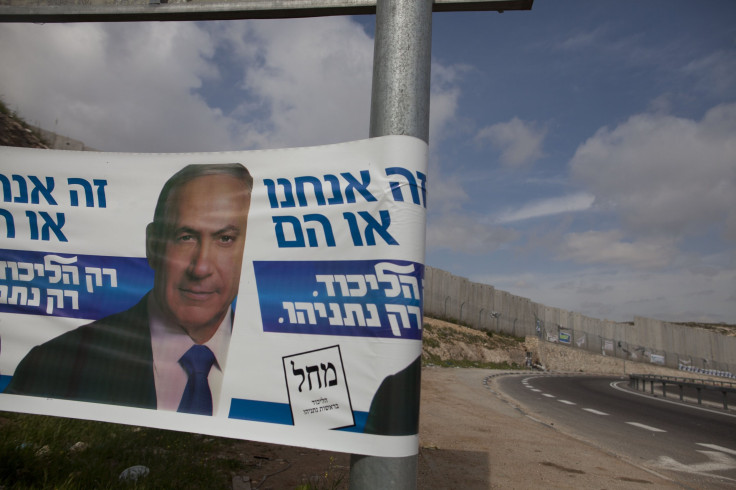Israel Elections: Palestinians Not Optimistic About Future Peace Talks, Regardless Of Vote Outcome

Palestinians were largely resigned to the idea that the ongoing Israeli elections would not yield much progress on the Israeli-Palestinian conflict, with negotiations around a two-state solution floundering under the right-wing government of Prime Minister Benjamin Netanyahu. Even as Netanyahu faced his biggest political challenge yet, and amid the remarkable rise of Israel’s first united Arab party, few were optimistic that the prospect of Palestinian statehood would be any closer after the elections.
While the election campaign has produced a series of unexpected developments, the status quo for Palestinians was likely to live on as the new forces on the Israeli political scene would be unable to produce any major transformations in the peace process, according to Hussein Ibish, a senior fellow at the American Task Force on Palestine in Washington.
“The essential elements of Israeli policy are unlikely to change, because there is no consensus in Israel on what to do about the Palestinians and the occupation,” he wrote in a commentary for the National.
Netanyahu made it resoundingly clear in the lead-up to the election that a victory for his Likud party would rule out attempts at negotiating a two-state solution to the conflict, saying Monday that if he returned to office he would never allow for the establishment of a Palestinian state. The prime minister’s main rival, Isaac Herzog of the center-left Zionist Union party, has said that he backed a two-state solution and has promised to revive stalled talks with the Palestinian Authority.
For some, the prospect of seeing Netanyahu unseated from power, regardless of the viability of peace talks under his successor, was a welcome-enough possibility on its own.
“Changing one leader in Israel doesn't mean magic will happen. I am not naive,” Palestinian-American activist Linda Sarsour tweeted. “But Netanyahu losing would be awesome.”
A Zionist Union victory would make the idea of improvements on the intractable issue more plausible, according to Ibish, who pointed to the possibilities of more restraint on settlement activity, a greater commitment to the two-state solution and more serious engagement with the Palestinian Authority. However, “the resurgence of the center-left in this election has been based on social and economic policies, not security or relations with the Palestinians,” he said. The party is widely expected to prioritize delivering on its economic and social promises if it comes to power.
Indeed, the Palestinian issue has played an insignificant role on the campaign trail, with most political parties opting instead to focus on socio-economic issues and the security threat posed by Iran, rather than peace talks. At a recent debate between party leaders from across the political spectrum, the conflict with the Palestinians was barely addressed, with the word “peace” mentioned during the 90-minute debate only five times -- with three of those mentions made by the only Arab candidate.
The general apathy toward the issue is shared by some Palestinians. "People have given up on the two-state solution on the Palestinian side,” Ahmad Aweidah, a Palestinian businessman living in the West Bank, told NPR. “Twenty years of pointless negotiations and accelerating colonization, I think, have pretty much put any kind of belief or optimism about a two-state solution to bed a long time ago."
While Palestinians in the West Bank do not get a vote in the elections, Palestinian citizens of Israel constitute 20 percent of the country’s 8 million population and stand to wield unprecedented political clout in the Knesset following the dramatic ascension of the Joint Arab List party. Polls ahead of the election showed the faction, which united four separate Israeli Arab parties under one banner for the first time ever, winning 13 seats or more in the 120-seat Knesset.
The Joint List’s performance in this election is a rare bright spot for Palestinian observers who see the possibility of an unprecedented Knesset showing by the party as a means of mobilizing greater Arab political engagement in Israeli politics. It could also give Israel’s Arab citizens a way of influencing government, despite the fact that no Arab political party has ever been included in any Israeli government coalition -- something that is still unlikely to change after this election.
“By propping up a center-left Israeli government from outside its ranks, as was done during the era of Yitzhak Rabin, Palestinian citizens could play a crucial role in engineering a change of government in Israel,” Ibish wrote. However, the faction will “have to develop their clout over time before they can truly begin transforming Israeli policies as well as politics.”
© Copyright IBTimes 2024. All rights reserved.






















